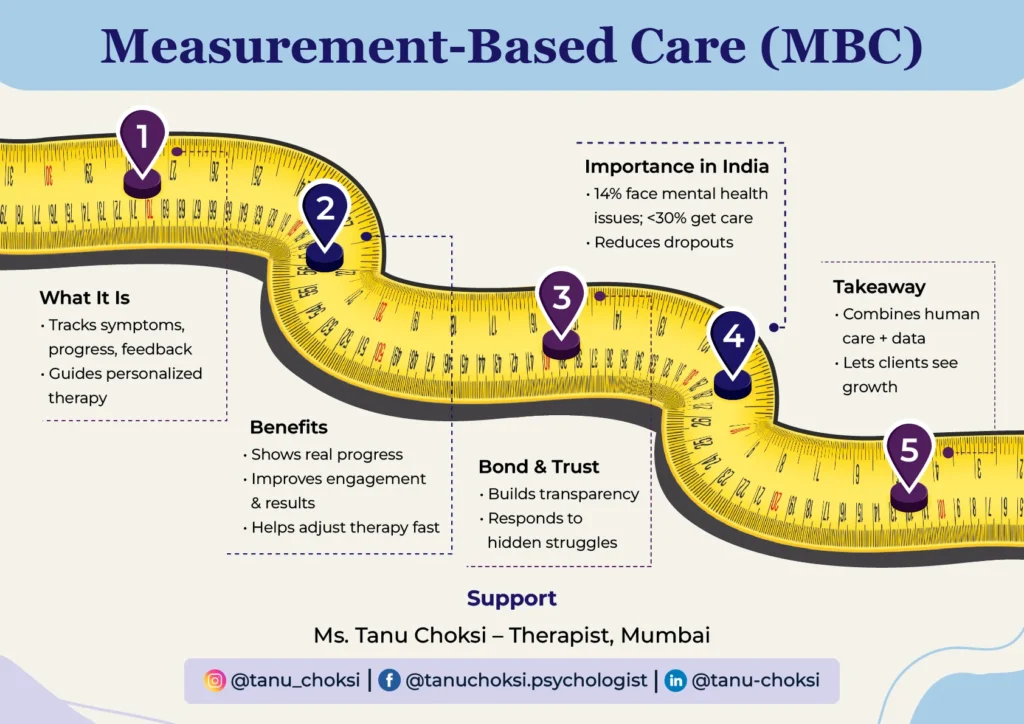As a therapist in Mumbai, I have learned one big thing. Helping people get well is not a guess game. Each person comes with their own story. They need a care plan that can change and show it works with real facts.
This is what Measurement-Based Care (MBC) is for. It is more than just looking at signs of a problem. It is a way to use what we know, care, and facts to make a plan just for you. This helps in new ways. If you need help for anxiety, PTSD, child counseling, or couple counselling in Mumbai, MBC is key. It helps get good results that can last. Let me tell you what it is, why it is a good thing, and how it is changing care in India and the world.
What Is Measurement-Based Care?
Measurement-Based Care is when we check a client’s symptoms, progress, and feedback through their treatment. We do this at set times. These checks are not a test to grade you. They help us make good choices at the right time.

Think of it like this: for your body, a doctor uses blood tests to track improvement. For mental health, we use tools that work, like lists to check mood or anxiety. These tools are like a map. They help us stay on the right path. Or they help us find a new one if we need to.
As a licensed psychologist in India, I use MBC to:
- See how well you do in individual therapy and group therapy sessions in Mumbai.
- Change how we use cognitive behavioral therapy or treatment for trauma-informed issues.
- Find signs of big problems like chronic post-traumatic stress disorder symptoms fast.
- Make choices with clients, not for them.

1. Checking How You Do Now Makes Things Better
One of the best parts of MBC is that it is transparency. Clients can see how they are doing with numbers. They see the good and the bad. This makes things clear. It gives them more say. Studies show that MBC can make it twice as likely that treatment will work well. A new 2024 study found that people who used MBC got more into their treatment. They saw results go up fast. And they stayed in care.
I have seen this in my work. A teen I worked with said, “I did not think I was getting well—then I saw it on the page.” This way of care has been a big help for people in depression therapy, OCD treatment in India, and anxiety management programs in Mumbai. In these cases, it can be hard to see small changes.
2. It Helps Us Change Your Plan—Fast
Not all ways to help work for all people. With MBC, we do not have to wait a long time to see if a plan is not working. The data speaks early.
For example, if a client does not get better with group therapy or premarital counseling services in Mumbai, their scores may stay the same or go down. That tells me it is time to try new things. We could try one approach. We could even ask a family therapist in Mumbai to help. And the best part? We make this change with the client. MBC lets us have real talks like:
- “Do you feel these talks help?”
- “How was your sleep last week?”
- “What do you want us to focus on next?”
This path we take together is a big deal for online psychologist consultation in India. It can be hard to build a bond from far away. The numbers give us a shared way to talk and understand.
3. It Makes the Bond Between Us Strong
Some people may think MBC makes therapy feel robotic. But it is not so. It builds trust.
When clients see that we listen to the facts and act on how they live and feel, the bond gets deep. It says, “I am not just here to talk—I am here to grow with you.”
I see this a lot with young folk in teen therapy. I see it with pairs in relationship counselling in India. And with parents who need help with child counseling. To put a number on feelings makes things clear when they feel like a mess.
It also helps when things get bad fast. For example, if a person’s anxiety score goes up all at once, I can help right away. I can do this even if they have not yet said they feel bad. This is a big help for people with PTSD or other deep past harm. Their signs may not be easy to see.
Why This Is So Needed in India Now
MBC is growing all over the world. India is coming up fast. More people now use online depression and anxiety tests in India. So, more people know about their mental health. People like me are now using new tools to make this easy. We use them a lot in online psychologist consultations. The need for mental health care in India that you can count on and see is very high:
- More than 14% of the people in India have mental health problems (WHO, 2024)
- Not even 30% get the right care.
- More than 40% of people stop caring—a big reason is that they do not see how they are getting well.
MBC can bridge this gap. It lets top-rated OCD specialists in Mumbai, certified cognitive behavioral therapists, and experienced marriage and family therapists in Mumbai use facts to show their care works.
Conclusion: Data with a Heart
Therapy is not about charts and lists. It’s about people. How are you feeling? Your stories. But when we mix those stories with what we learn from tracking, the results are very good.
As a psychologist in India, I have seen that MBC does not make therapy less human—it makes it better. It helps me show my clients: Look how far you’ve come. Let’s decide, together, where to go next.
If you are thinking about therapy, ask your helper if they use measurement-based care. And if you are in therapy now, know that tracking how you get well is worth it, not to push you, but to remind you that you can change.
Practo Profile Line: Ms. Tanu Choksi is a kind counselor and therapist in Mumbai, offering patient, smart help for your problems without judgment. For more good ideas, follow me on Instagram, Facebook, and LinkedIn.




